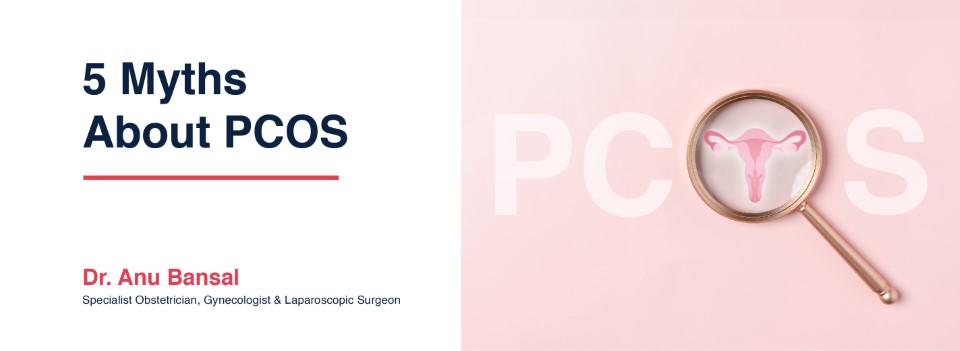Polycystic Ovary Syndrome (PCOS) is a complex and often misunderstood condition affecting millions of women worldwide. Despite its prevalence, many myths and misconceptions surround it. Understanding PCOS is the first step toward effective management. Let’s explore some of the most common myths.
Myth #1: You Did Something Wrong to Get PCOS
One of the most prevalent misconceptions about PCOS is that it’s somehow your fault. The truth is that the exact cause of PCOS is not fully understood, and you should not blame yourself. Genetics are believed to play a significant role in the development of PCOS. Women with this condition often have elevated levels of androgens, commonly known as male hormones, leading to irregular menstrual cycles and difficulties with ovulation. In PCOS, follicles may develop, but eggs are not released, preventing ovulation. Hormonal imbalances can cause cyst formation and reduce progesterone production, further contributing to irregular cycles. Additionally, many women with PCOS experience insulin resistance, which can exacerbate symptoms and increase androgen levels. A family history of PCOS can also heighten your risk of developing the condition.
Myth #2: Weight Loss Will Cure PCOS
While there is no complete cure for PCOS, lifestyle changes, such as weight loss, can help manage the condition, especially for those who are overweight or obese. Losing excess weight can help balance hormone levels and improve insulin sensitivity, alleviating some symptoms. However, weight loss alone is not a cure. Treatment typically focuses on managing symptoms rather than eliminating the condition. A combination of healthy eating, regular exercise, and sometimes medication can help regulate menstrual cycles, lower androgen levels, and prevent long-term health risks. For those not seeking pregnancy, birth control pills can regulate cycles and reduce the risk of endometrial cancer by balancing estrogen levels. However, they can increase the risk of blood clots in certain women, especially those over 40 or with obesity, so consulting with your doctor about the best treatment options is essential. For women trying to conceive, fertility medications can stimulate ovulation, while procedures like ovarian drilling may temporarily lower androgen levels, though they carry risks, such as scar tissue formation.
Myth #3: PCOS is a Rare Health Condition
Contrary to popular belief, PCOS is not rare. In fact, it is one of the most common endocrine disorders in women. Despite its prevalence, many women remain undiagnosed or misdiagnosed, leading to prolonged suffering from symptoms like infertility, irregular cycles, and hormonal imbalances. The PCOS Foundation estimates that about 70% of fertility issues in women with ovulation difficulties are linked to PCOS.
Myth #4: You Can’t Conceive if You Have PCOS
This myth causes unnecessary fear among women with PCOS. While it’s true that PCOS can make conception more challenging, it does not make pregnancy impossible. Many women with PCOS successfully conceive with proper fertility treatments. A variety of fertility medications can stimulate ovulation, improving chances of conception. In more advanced cases, assisted reproductive technologies like in vitro fertilization (IVF) may be recommended. Doctors advise that women with PCOS who are not trying to get pregnant should still use contraceptive methods, as intermittent ovulation can occur, making pregnancy possible even without regular cycles.
Myth #5: PCOS Only Affects Overweight and Obese Women
While it is true that many women with PCOS are overweight or obese, the condition can affect women of all shapes and sizes. Obesity can exacerbate PCOS symptoms, but weight is not the sole factor contributing to the condition. The core issue in PCOS is how the body processes insulin, and insulin resistance can lead to weight gain. However, thin women can also develop PCOS, proving that it doesn’t exclusively affect those with higher body weights. Regardless of body type, adopting a healthy lifestyle, including balanced eating and regular physical activity, is vital for managing PCOS and improving insulin sensitivity.
By debunking these common myths, women can take control of their health and feel empowered to seek appropriate treatment for PCOS. Managing the condition involves understanding its complexities, including the interplay of hormones, genetics, and lifestyle factors. With the right support, women can lead healthy, fulfilling lives despite the challenges posed by PCOS. If you suspect you have PCOS or have been diagnosed with it, talk to our healthcare provider about the best ways to manage your symptoms and protect your long-term health.











